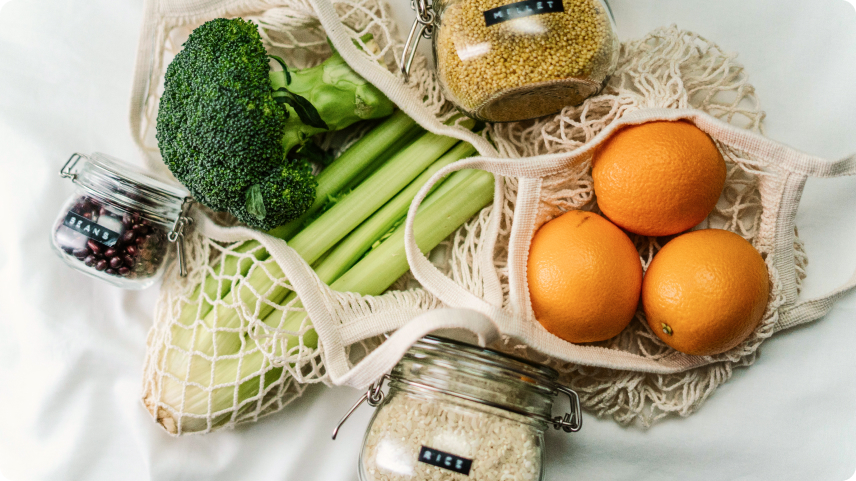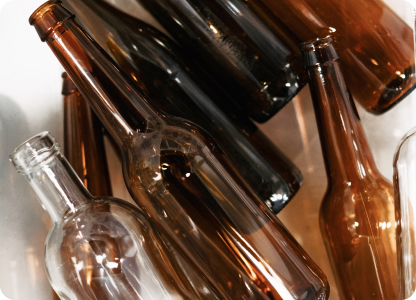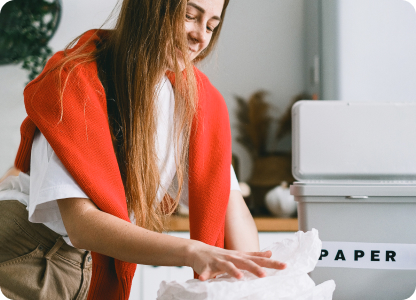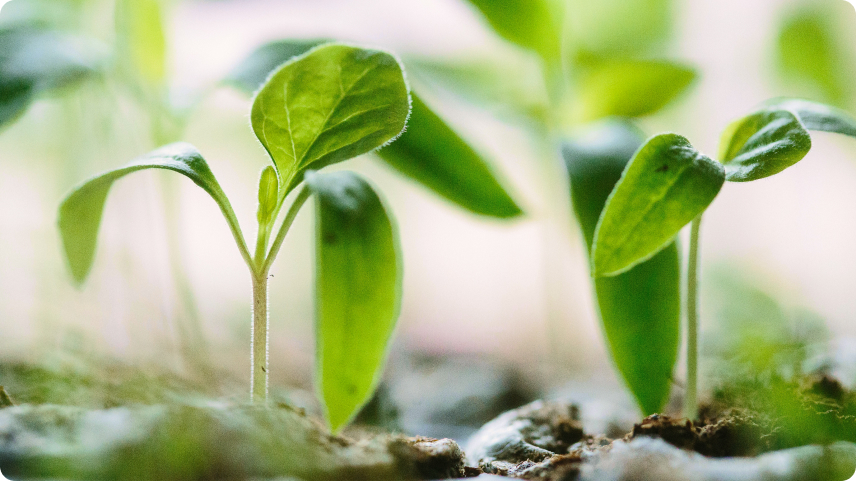10 Steps for a Healthy Lifestyle

Everywhere we go there’s ads for some new thing that’s going to change your life. The city streets feel busy and grey, you’re munching on a sandwich you got from the corner shop while heading somewhere important. An influencer on your phone is talking all about their new green and sustainable lifestyle, and you just wish a little bit you could be like them. Sound familiar?
78% of us want to be more sustainable1, but how do we start? With many of us wondering if being more eco-friendly is going to increase our spending or if we can maintain a healthy lifestyle, embarking on a sustainability journey can be confusing. To help you get started, we’ve assembled 10 steps you can take to lead a healthy and sustainable life.
-
- Choose plant-based foods
Animal agriculture is estimated to produce around 18% of greenhouse emissions worldwide2. Eating less meat and replacing it with vegetarian and vegan sources of protein is an easy way to lower your impact on the planet. If you’re unsure of where to start, we have plenty of recipes to inspire you.
If you’re worried about your protein intake on a vegan diet, you can add vegan supplements that contain amino acids. This is especially helpful for those going to the gym – Maxler BCAA 8400 is a high dose of vegan BCAAs that will support muscle growth.
-
- Eat with the seasons
Knowing what’s in season is great for your eco-footprint. In season produce can last you longer, is full of good micronutrients, and is often cheaper. Plus, you can can, freeze, or dry things in bulk to make it last a while.
If you’re looking for inspiration, we got you - try some of our Delights of Seasonal Produce recipes, like this roasted butternut squash and brussels sprouts or avocado mango salsa!

-
- Take care of your health with sustainable supplements
If you’re needing to increase your intake of particular nutrients, choose supplement brands that care about their product and the environment. Part of being sustainable is using quality raw materials, such as organically grown plant extracts or milk from well-cared for grazing cows. Maxler is GMP certified, meaning that our products are made from great raw materials and in places with good working conditions.
-
- Improve your performance sustainably
If you’re not quite ready to go full vegan, but need a hand in the gym, choose vegan sport supplements. You might be surprised, but many of Maxler’s sports supplements are produced from vegan sources, and we’re striving to use plant raw materials where we can as we develop new products.
For athletes looking to increase their muscle strength, 100% Golden Creatine is a great vegan choice. For endurance and cardio lovers, 100% Golden Glutamine will support the immune system after a hard workout and help you recover quickly.
-
- Stay hydrated through tap water
Want a first sustainable step that’s easy as pie? Drink tap water or use filters where you can. A re-usable water bottle is a great way to stop producing plastic waste when trying to stay hydrated. Plus, a re-usable vessel allows you to add great flavoring or electrolytes, like Maxler Electrolyte Powder, when you’re needing to re-hydrate quickly.
-
- Planning helps reduce waste (and makes life cheaper)
One of the easiest steps to live more sustainably is to reduce waste. An easy example is taking a reusable bag to the store. But you can truly do a lot from your kitchen – with almost 40% of food in America being wasted, it’s time to address the issue of spoilt produce3. Meal planning and prepping is a great way to ensure your food is used up with minimal waste. And it’s great for your wallet too!
-
- Recycle what you can
If you can’t avoid making waste, recycle it! There’s no need for us to produce more material when we can re-use existing material, so separate your trash. A great bonus is that you can pop most Maxler packaging into the recycling bin, just check the packaging labels.


-
- Turn your food into compost
Another great way to take care of food waste is composting. Small compost bins can fit big houses, cramped dorms, or family flats. Alternatively, you can freeze organic waste in containers, which helps to avoid nasty smells. Your food can serve as a great fertilizer for your garden, houseplants, or used at an allotment. Or, you can see if any farms nearby might take your compost.
-
- Immerse yourself in nature
One of the biggest issues right now is that we’re becoming more disconnected with nature – more than 50% of us only spend around 5 hours or even less per week in nature4. But sustainability requires you to care for the environment around you, and appreciating and re-connecting with nature, such as through hikes or cycling in a park, is an easy way to do so.
If you want to learn more about how nature can benefit you, check out our blog post.

-
- Be compassionate to yourself – it’s a process
Becoming more sustainable is about a series of small steps. It can be hard to find one thing to start from and becoming sustainable can feel overwhelming. However, you don’t have to completely turn your life around – instead, choose small changes you can stick to. Like we do: we understand that we need a lot of things to do in order to become fully sustainable, but we’re on our way! Be kind to yourself – occasionally having to use a plastic bag isn’t going to end the world – just stick a reminder for yourself the next time you leave the house. You’ll be back on track in no time.
Sustainability is an effort all of us must engage in together, as every small change will make a massive difference if billions of people are making it. Becoming more sustainable is a long process, but with our tips you have a great place to start. No matter your lifestyle or budget, you can be kinder towards the planet and yourself.






